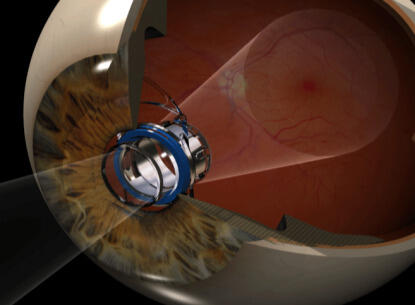
April 15, 2013
VCU Medical Center First in Virginia to Implant Telescope for Macular Degeneration
Share this story
Physicians at the Virginia Commonwealth University Medical Center have become the first in Virginia to successfully implant a telescope in a patient’s eye to treat macular degeneration.
The telescope implant is designed to correct end-stage age-related macular degeneration (AMD), the most advanced form of AMD and the leading cause of blindness in older Americans. Patients with end-stage AMD have a central blind spot. This vision loss makes it difficult or impossible to see faces, to read and to perform everyday activities such as watching television, preparing meals and self-care.
William H. Benson, M.D., a cornea specialist and chairman of the Department of Ophthalmology at the VCU School of Medicine, performed the procedure.
“We are excited to provide this new surgical option to our advanced macular degeneration patients, who up until now have had limited options for improving vision,” Benson said. “Advanced macular degeneration is a devastating disease, which cannot be treated by any available drugs or surgical procedures. The telescope implant offers a new hope for patients with limited vision.”
Smaller than a pea, the telescope implant uses micro-optical technology to magnify images that would normally be seen in one’s “straight ahead” or central vision. The images are projected onto the healthy portion of the retina not affected by the disease, making it possible for patients to see or discern the central vision object of interest.
The Implantable Miniature Telescope (By Dr. Isaac Lipshitz) is a product of VisionCare Ophthalmic Technologies, Inc.
Subscribe to VCU News
Subscribe to VCU News at newsletter.vcu.edu and receive a selection of stories, videos, photos, news clips and event listings in your inbox.







